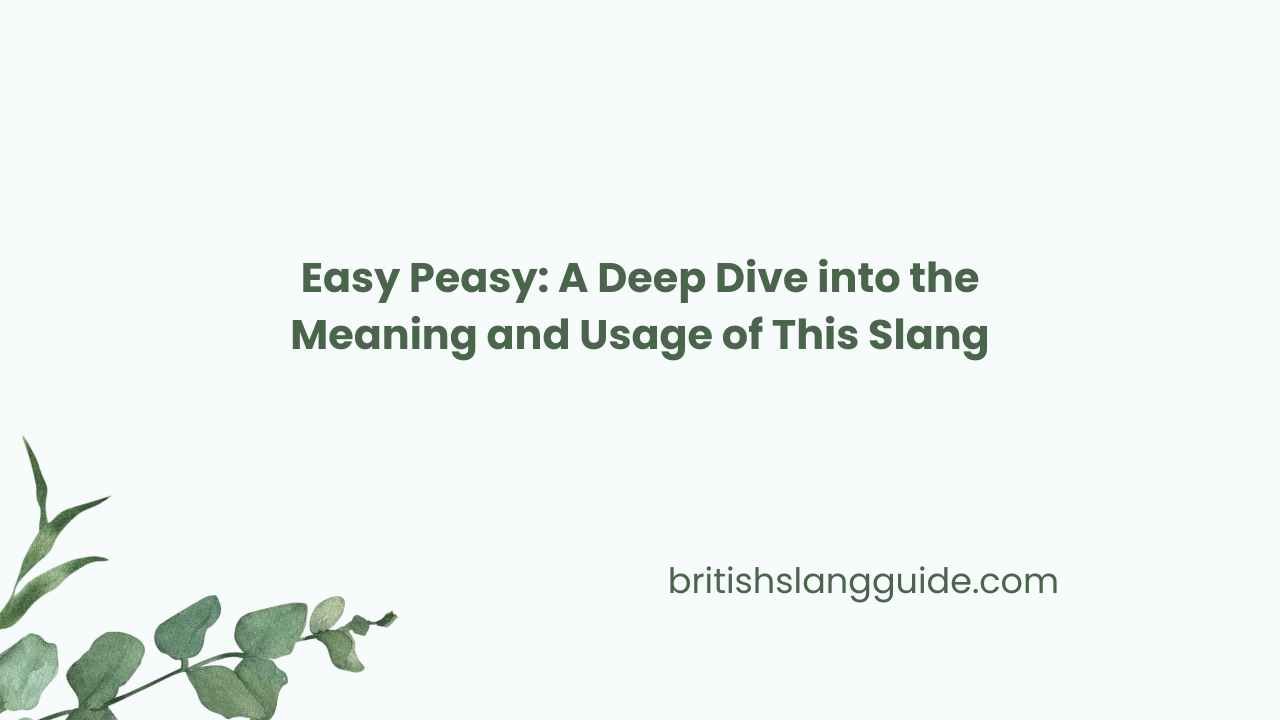| Please Wait Loading ..... |
 |

There are different ways to express different emotions and slang often is used to describe those emotions in the most fun way like “easy pease”. This slang is used in many different situations, for example, if you are talking about your problems or you are worried about completing your task, or you try to explain a topic to children, you use it to create a sense of simplicity or a cheerful tone.
This slangs holds a great impact in our daily conversations because people are seen using it more often. Moreover, its childish structure makes it easy to remember and it helps to create a relaxed mode of communication. But the question is what is the origin of this slang and in what situations do people use it? If you have the same question in your mind, you will find the answer here by reading it at the end.
In this article, we will deeply explore the meaning of this slang, its historical background, and how it is used in a modern context.
The simple meaning of the slang is “very easy” or “not difficult”. This slang is used to emphasize that something needs very little or no effort. For example, if someone asks you how difficult it is to solve this problem and you say: “Oh that is so easy peasy”. Rather than using a simple word “easy” we use this slang to make our daily conversations more fun.
This slang is mainly used in funny situations in a humorous way. This term is used to convey effortlessness. It is also often used in informal speeches rather than in professional conversations.
The origin of this slang is from the mid-20th century. The exact origin of this language is still unclear but it is just due to its childlike issue structure that it may have started in the playgrounds of the groups of children. Because children like rhyming phrases, easy peasy also fits perfectly in this pattern. The phrase easy Peasy lemon squeezy is an advertisement phrase which came from a 1950 advertisement for lemon dishwashing liquid.
Over time, this phrase stuck in people's minds due to its funny structure. Also, it quickly spread from the UK to the whole world.
The thing that makes this language unique is not its fun structure or its meaning but it is its historical background. In the mid-20th century when advertisements of a business relied on catchy rhymes to attract a customer's attention, this slang became popular. For example, a very popular phrase that is specially designed to capture public attention and to stick in the memory is, “Easy Peasy, Lemon Squeezy”. In British culture, this became a mark of lightheartedness.
This language is very popular among parents and children. It is used in games for playful instructions or also in parenting and teaching. Over time it has become quite popular in movies, comedy shows, and also used in popular speeches.
Nowadays, this language is used in multiple contexts. The flexibility of slang allows us to use it in different communication or many creative ways. There are many modern uses of slang so let’s discuss in detail in which situations you can use it in or not?
For example, in our daily conversation, we use it when we are talking to our family members or friends to describe something for example. “Don’t be worried, making it is very easy peasy”. It is used in teaching or parenting so parents use this slang to make studying less intimidating and hard. Like “Math homework? Don’t be stressed, it's very easy peasy.”
Many brands use it to create a very friendly image and you use a very rhyming language in their advertisement. The modern uses of this slang show that a language changes over time.
Like many other phrases, easy peasy has also lost its charm over time. Why? Because it overuses diminishes the original meaning and emotion. Because this term is so informal and so it is used in many wrong situations such as in serious situations and or in professional conversations where using such slang seems unprofessional and overly casual.
For example, someone saying that this medical procedure is very easy-peasy, and in this situation, it sounds very inappropriate. The use of slang depends upon the seriousness of the situation. The overuse of this slang makes such phrases sound irrational.
Although this slang may seem straightforward it carries a journey from its childish rhyme to appearing in the movies, TV shows. This slang is more than just two words that rhyme perfectly, it shows us how languages can be used playfully at the same time conveying a deep meaning and emotion.
Comments